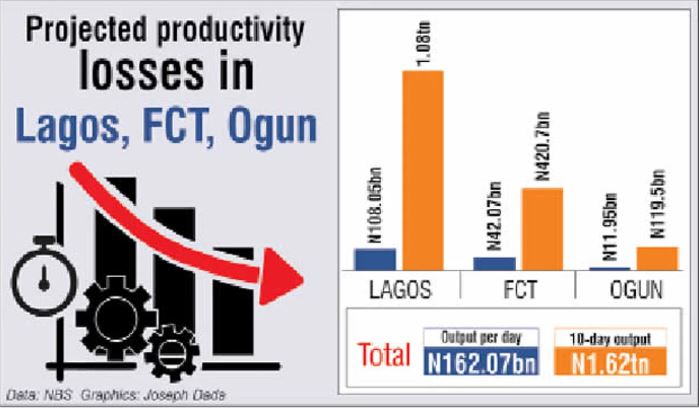
At least N1.62tn is expected to be lost in terms of monetary output by businesses and firms as a result of the two-week restriction of movement imposed on Lagos, Ogun and the Federal Capital Territory by the Federal Government.
The PUNCH arrived at the amount based on an analysis of the nominal Gross Domestic Product of Lagos, Ogun and the FCT.
The Federal Government had on Sunday restricted movements in two states and the FCT in a bid to check the spread of the coronavirus pandemic.
The coronavirus pandemic had led to unprecedented disruptions in supply chains, sharp drop in global crude oil prices, turmoil in global stock and financial markets, and lockdown in movements of persons in many countries among others.
Experts say the overall medium-term outlook for the global economy remains uncertain with increased deterioration in financial market conditions and weak global output growth.
Some of the major threats to the current projection for global economic growth include disruption to the global supply chain arising from the COVID-19 pandemic; oil price downturn as a result of subdued global demand and vulnerabilities in major financial markets.
Based on the analysis of the GDP figures, Lagos, Ogun and the FCT have a combined nominal GDP of about N40.49tn.
A breakdown of this figure shows that Lagos with N27.12tn has the highest nominal GDP followed by FCT with N10.56tn while Ogun had nominal GDP of about N2.81tn.
There are 366 days in the 2020 fiscal period out of which 251 are working days. There are 52 Saturdays and Sundays each in 2020 giving a total of 104 days, while the remaining 11 days are public holidays.
Based on the analysis by our correspondent, businesses in Lagos with a nominal GDP of N27.12tn are expected to lose daily output of N108.05bn
For the ten working days that the lockdown is expected to last, about N1.08tn is projected to be lost by businesses and firms.
For the FCT, the nominal GDP is estimated at N10.56tn and for the ten working days that the lockdown is expected to last, the projected losses in productivity is estimated at N420.7bn.
For Ogun the state has a nominal GDP of N2.81tn with a daily average output of N11.95bn.
For the ten working days that the lockdown is expected to last, about N119.5bn is projected to be lost in terms of productivity.
The Minister of Finance, Budget and National Planning, Mrs Zainab Ahmed, had on Friday warned that the Nigerian economy could slide into recession if the coronavirus pandemic continues for the next six months.
She had said, “We are hopeful that this pandemic will be limited in time. If it is an average of three months, we should be able to close the year with positive growth.
“But if it goes longer than that – six months to one year – we will go into recession.”
A professor of Capital Market Studies, Uche Uwaleke, said that the shutdown would affect Nigeria’s economy negatively.
Uwaleke in a telephone interview said that Nigeria’s revenue from oil would be seriously affected by the impact of COVID-19.
He said, “The implication for Nigeria is that world trade had dropped; trade between Nigeria and other countries will suffer; there will be more capital flight because foreign investors will move to an economy that is safer.
“It has implications for export particularly oil which would lead to lower revenue for Nigeria; our trade and investment will also fall.
“If care is not taken, except the CBN continues to defend the naira, it will affect exchange rate.”
To survive the economic crisis, he said, “We need to produce and prioritize our spending by spending more on food and pursue import substitution.”
In his comments, a professor of Economics at the Olabisi Onabanjo University Ago-Iwoye, Ogun, Sheriffdeen Tella, said it would take a while before the economy recovered from the pandemic.
He said, “There is no production in the last two weeks and when there is no production, a lot of industries will be shut down and it will cause a drawback.
“There is also uncertainty as to when production will start in many parts of the world. So, we are already in recession as it were.
“Since we are in a global community, it means we are also in recession. If it doesn’t go far, then we won’t go into depression because if we go into depression, it’s going to be serious.
“To come back to the production level we were before will take some time. The implication is that it will not be very easy for our oil which is our major product to pick up.
“This means that our own economy will be slower in picking up than those other developed economies.”
***
Source: The PUNCH
You may be interested

‘I’m Incredibly Proud’– Arokodare Talks Up Genk’s Unbeaten Home Streak
Webby - December 23, 2024Tolu Arokodare is full of excitement followingGenk’s historic victory over Anderlecht, reports Completesports.com.Sunday’s win at the Cegeka Arena was the…

WAFU B U-17 Girls Cup: Ghana Edge Gallant Flamingos On Penalties In Final
Webby - December 22, 2024Despite a spirited performance Nigeria’s Flamingos lost on penalties to hosts Ghana on penalty shootout in the final of the…

Bournemouth Equal Burnley’s Old Trafford Feat After 3-0 Win Vs United
Webby - December 22, 2024Bournemouth’s 3-0 win against Manchester United on Sunday meant the Cherries equaled Burnley’s feat at Old Trafford.United went into the…


















![American Pastor, David Wilson Seen Eating The Box Of Woman Who Isn’t His Wife [Video]](https://onlinenigeria.com/wp-content/uploads/2019/10/american-pastor-david-wilson-seen-eating-the-box-of-woman-who-isnt-his-wife-video-150x150.jpg)








